- Home
- Julian May
The Many-Coloured Land
The Many-Coloured Land Read online
The Many-Coloured Land
Volume 1
The Saga of the Exiles
Julian May
CONTENT
Dedication
Psalm 55
PROLOGUE
Chapter One
Chapter Two
Chapter Three
PART I: The Leavetaking
Chapter One
Chapter Two
Chapter Three
Chapter Four
Chapter Five
Chapter Six
Chapter Seven
Chapter Eight
Chapter Nine
Chapter Ten
Chapter Eleven
Chapter Twelve
Chapter Thirteen
Chapter Fourteen
Chapter Fifteen
Chapter Sixteen
Chapter Seventeen
Chapter Eighteen
Chapter Nineteen
PART II: The Initiation
Chapter One
Chapter Two
Chapter Three
Chapter Four
Chapter Five
Chapter Six
Chapter Seven
Chapter Eight
Chapter Nine
Chapter Ten
Chapter Eleven
Chapter Twelve
Chapter Thirteen
Chapter Fourteen
Chapter Fifteen
Chapter Sixteen
Chapter Seventeen
Chapter Eighteen
PART III: The Alliance
Chapter One
Chapter Two
Chapter Three
Chapter Four
Chapter Five
Chapter Six
Chapter Seven
Chapter Eight
Chapter Nine
Chapter Ten
Chapter Eleven
Dedication
For Tadeusz Maxim, the noblest of them all
Psalm 55
My heart is sore pained within me and the terrors of death are fallen upon me.
Fear and trembling have seized me and darkness has overwhelmed me.
And I said: O that I had wings like a dovel. For then I would fly away and be at rest.
Lo, would I flee far away, and live in the wilderness.
I would wait for him who will save me from my cowardice and from the storm.
PROLOGUE
Chapter One
To confirm that it was indeed near death, the great vessel broke through into normal space with lingering slowness. The pain of the usually swift translation was prolonged as well, until the thousand, for all their strength, cursed and wept within their minds and became convinced that they would be trapped. It would be the gray limbo endlessly. That and pain.
But the Ship was doing its best. Sharing the agony of the passengers, it pushed and pried against the tough fabric of the superficies until there were flickers of black against the gray. The Ship and the people felt their anguish dim into a mere harmony of nearly musical vibrations that echoed, damped, and finally snapped off.
They hung in normal space, stars all around them.
The Ship had emerged in the shadow cone of a planet. For long moments, as the stunned travelers watched without knowing what they saw, the halo of pink atmosphere and the pearly wings of the eclipsed sun's corona gave an aureole to the black world. Then the Ship's ominous momentum carried them on; the chromosphere and the orange flames of the sun's limb burst forth, followed by its dazzling yellow substance.
The Ship curved in. The sunlit surface of the planet seemed to roll open beneath them at their approach. It was a blue world with white clouds and snowy mountains and landmasses of ochre and red and gray-green, beyond doubt a world of compatible life. The Ship had succeeded.
Thagdal turned to the small woman at the directive console. Brede of the Two Faces shook her head. Dreary violet patterns on the motive display made plain that it had been the final effort of the Ship that brought them to this haven. They were fully in the grip of the system's gravity and no longer capable of inertialess locomotion.
Thagdal's mind and voice spoke. "Listen to me, remnant of battle companies. Our faithful craft has all but perished. It subsists only on mechanicals now and they will not serve much longer. We are on an impact trajectory and we must disembark before the hulk enters the lower atmosphere."
Emanations of sorrow, rage, and fear filled the dying Ship. Questions and reproaches threatened to stifle the mind of Thagdal until he touched the golden torc around his neck and forced them all to be silent.
"In the Name of the Goddess, hold! Our venture was a great gamble, with all minds turned against us. Brede is concerned that this place may not be the perfect refuge we had hoped for. Nevertheless, it is fully compatible, in a remote galaxy where none will dare to look for us. We are safe and have not had to use Spear or Sword. Brede and our Ship have done well to bring us here. Praise to their strength!"
The antiphon was raised dutifully. But sticking up out of the symmetry of it was a prickly thought:
Hymns be damned. Can we survive here?
Thagdal lashed back. "We will survive if Compassionate Tana wills, and even find the joy that has eluded us so long. But no thanks to you, Pallol! Shadow-sib! Ancient enemy! Trucebreaker! When we are delivered from this immediate peril you will answer to me!"
A certain amount of vulgar enmity swirled up to merge with Pallol's; but it was fogged by the dull-witted tone of mind that comes from the relief of terrible pain. Nobody else really wanted to fight now. Only the irrepressible Pallol was as game as ever.
Brede Shipspouse flowed soothingly over the impending shambles. "This Many-Colored Land will be a good place for us, my King. And you need have no fear, Pallol One-Eye, I have already sounded the planet, lightly, of course, and found no mental challenge. The dominant life-form dwells in speechless innocence and can be no threat to us for more than six million planetary orbits. Yet its germ plasm is indeed compatible for the nurturing and the service. With patience and skilled labor we will surely survive. Now let us go forth from here holding to our truce awhile longer. Let no one speak of vengeance, nor of mistrust of my beloved Spouse."
"Well said, Prescient Lady," came the thoughts and spoken words of the others. (Any dissenters were now keeping well submerged.)
Thagdal said, "The small flyers are waiting for us. As we depart, let all minds be raised in salute."
He went stomping from the control deck, golden hair and beard still crackling with squelched fury, white robes brushing over the now dulled metalloid of the decking. Eadone, Dionket, and Mayvar Kingmaker followed after, minds linked in the Song, fingers giving a farewell caress to the fast-cooling walls that had once thrummed with benevolent power. Little by little the others in various parts of the Ship took up the anthem until nearly all of them were in communion.
Flyers spurted away from the moribund vessel. More than forty birdlike machines pierced the atmosphere like glowing darts before decelerating abruptly and spreading their wings. One took the lead and the others formed a stately procession in its wake. They flew toward the world's largest landmass to await the calculated impact, came up from the south and crossed over the most distinctive feature of the planet, a vast, nearly dry sea basin, glittering with salt pans, which cut an irregular gash across the western reaches of the major continent. A snowy range made a barrier north of this Empty Sea. The flyers went beyond the mountains and hovered over the valley of a large eastward-flowing river, waiting.
The Ship entered on a westerly course, leaving a fiery trail as it ablated in the atmosphere. It swept the ground with a horrendous pressure wave that incinerated vegetation and altered the very minerals of the landscape below. Molten globules of green and brown
glass showered the eastern highlands as the Ship's integument exploded away. The river waters vaporized from their bed.
Then came the impact, light-burst and heat-burst and sound-burst, as more than two thousand million tons of matter with a velocity of twenty-two kilometers per second inflicted its wound upon the world. The country rock metamorphosed; the substance of the Ship was all but consumed in the holocaust. Nearly a hundred cubic kilometers of planetary crust exploded upward and outward, the finer products rising in a black column to the stratosphere where the high thin winds spread them in a pall of mourning over much of the world.
The resultant crater was nearly thirty kilometers in diameter but not very deep, battered by tornadic storms engendered in the affronted atmosphere above the glowing ulcer in the land. The small flyers circled solemnly above it for many days, oblivious of the muddy hurricane as they waited for the earth-fires to cool. When the rain had done its work, the flyers departed for a long time.
They returned to the grave when their tasks were finally done and rested for a thousand years.
Chapter Two
The little ramapithecus was stubborn. She was certain that the baby must have gone into the tangle of maquis. His scent was there, distinct in spite of the heavy springtime perfume of heather, thyme, and gone.
Uttering crooning calls, the ramapithecus forced her way into the ancient burned-over area, moving uphill. A lapwing, vivid yellow and black, gave a peewit cry and limped away, trailing one wing. The ramapithecus knew that this charade was intended to distract her from a nearby nest; but thoughts of bird-prey were far from her simple mind. All she wanted was her missing child.
She toiled up the overgrown slope, using a piece of tree branch to beat down the brush that impeded her. She was able to utilize this tool and a few others. Her brow was low, but her face was quite vertical, with a small, humanoid jaw. Her body, a little over a meter in height, was only slightly stooped, and clothed except for the face and palms in short brown fur.
She continued her crooning. It was a message not framed in words, which any young one of the species would recognize: "Here is Mother. Come to her and be safe and comforted."
The maquis thinned out as she reached the crest of the height. Out in the open at last, she looked around and gave a low moan of fear. She stood on the edge of a monstrous basin containing a lake of deepest blue color. The rim curved away to the horizon on either hand, completely barren of vegetation along the narrow lip and down the steep slope to the water.
About twenty meters away from her stood a terrible bird. It was something like a fat heron but as tall as a pine tree and just as long, with wings, head, and tail drooping sadly to the ground. From its belly trailed a knobbly appendage with climbing holds. The bird was hard, not made of flesh. It was layered in dust, crusted and scabbed with yellow and gray and orange lichen over what had once been a smooth black skin. Far along the rim of the astrobleme, in both directions, she could see other such birds standing widely spaced, all looking into the dark-mirrored depths.
The ramapithecus prepared to flee. Then she heard a familiar sound.
She gave a sharp hoot. Immediately, a tiny upside-down head popped out of an orifice in the belly of the nearby bird. The child chittered happily. His sounds had the meaning: "Welcome, Mother. This is fun! Look what is here!"
Exhausted, overcome by relief, her hands bloody from breaking through the thorns, the mother howled in fury at her offspring. Hastily, he came down the exit ladder of the flyer and scuttled up to her. She scooped him up and crushed him to her breast, then she put him down and cuffed the sides of his head, left-right, pouring out a torrent of indignant chatter.
Trying to placate her, he held out the thing he had found. It resembled a large ring, but was really two conjoined semi-circlets of twisted gold, thick as a finger and rounded, incised with tortuous little markings like the borings of gribbles in sea-logged wood.
The young ramapithecus grinned and snapped open two knobby ends of the ring. The other ends were held by a kind of pivoting hinge that allowed the halves to rotate and open wide. The child placed the ring around his neck, twisted it and snapped the catch shut. The golden torc gleamed against his tawny fur, much too large for him but alive with power nevertheless. Smiling still, he showed his mother what he was now able to do. She shrieked.
The child leaped in dismay. He tripped over a rock and fell backward. Before he could recover, his mother was upon him, yanking the ring over his head so that the metal bruised his ears. And it hurt! The loss of it hurt worse than any pain he had ever known. He must get it back.
The mother screamed even louder as he tried to grab at the torc. Her voice echoed across the crater lake. She flung the golden thing as far away as she could, into a dense thicket of spiny gorse. The child wailed his broken-hearted protest, but she seized his arm and hauled him toward the path she had made through the maquis.
Well concealed and only slightly dented, the torc gleamed in the dappled shadows.
Chapter Three
In the early years after humanity, with a little help from its friends, had set out to overrun the compatible stars, a professor of dynamic field-physics named Theo Guderian discovered the way into Exile. His researches, like those of so many other unorthodox but promising thinkers of the time, were sustained by a no-strings grant from the Human Polity of the Galactic Milieu.
Guderian lived on the Old World. Because science had so many other things to assimilate in those exciting times (and because Guderian's discovery seemed to have no practical application whatsoever in 2034), the publication of his culminating paper caused only a brief flutter in the dovecote of physical cosmology. But in spite of the prevailing air of indifference, a small number of workers from all six of the coadunate galactic races continued to be curious enough about Guderian's findings to seek him out in his modest home-cum-workshop outside of Lyon. Even as his health failed, the Professor received these visiting colleagues with courtesy and assured them that he would be honored to repeat his experiment for them if they would pardon the crudities of his apparatus, which he had removed to the cellar of his cottage after the Institute disclaimed further interest in it.
It took Madame Guderian some time to become resigned to the exotic pilgrims from other stars. One had, after all, to preserve the social convenances by entertaining the guests. But there were difficulties! She overcame her aversion to the tall, androgynous Gi after much mental exercise, and one could always pretend that the Poltroyans were civilized gnomes. But she could never get used to the awesome Krondaku or the half-visible Lylmik, and one could only deplore the way that some of the less fastidious Simbiari dripped green on the carpet.
What was to be the last group of guests called just three days before Professor Guderian's terminal illness commenced. Madame opened the door to greet two outworld male humans (one alarmingly massive and the other quite ordinary), an urbane little Poltroyan wearing the gorgeous robes of a Full Elucidator, a two-and-a-half-meter Gi (mercifully with clothes on), and, Sainte Viergel, no less than three Simbiari.
She welcomed them and put out extra ashtrays and waste-baskets.
Professor Guderian conducted the extraterrestrial visitors to the cellar of the large country cottage just as soon as the politenesses had been exchanged. "We will proceed at once to the demonstration, good friends. You will forgive me, but today I am a trifle fatigued."
"Most regrettable," said the solicitous Poltroyan. "Perhaps my dear Professor, you would benefit from a rejuvenative course?"
"No, no," Guderian said with a smile. "One lifetime is quite enough for me. I feel I am most fortunate to have lived in the era of the Great Intervention, but I must confess that events now seem to be moving faster than my composure can tolerate. I look forward to the ultimate peace."
They passed through a metal-sheathed door into what was apparently a converted wine cellar. An area of stone paving some three meters square had been removed, leaving bare earth. Guderian's apparatus stood in
the middle of it.
The old man rummaged for a moment in an antique oak cabinet near the door and came up with a small pile of reading-plaques, which he distributed to the scientists. "A precis of my theoretical considerations and diagrams of the device are contained in these booklets, which my wife has been kind enough to prepare for visitors. You must excuse the simplicity of the format. We have long since exhausted our major funding."
The others murmured sympathetically.
"Please stand here for the demonstration. You will observe that the device has certain affinities to the subspace translator and thus requires very little power input. My own modifications have been designed with a view toward phasing in residual magnetics contained in the local rock strata, together with the deeper contemporary fields being generated beneath the continental platform. These, interacting with the matrices of the translator fields, generate the singularity."
Guderian reached into the pocket of his work smock and took out a large carrot. With a Gallic shrug, he remarked, "Expedient, if somewhat ridiculous."
He placed the carrot on an ordinary wooden stool and carried it to the apparatus. Guderian's device rather resembled an old-fashioned latticework pergola or gazebo draped in vines. However, the frame was made of transparent vitreous material except for peculiar nodular components of dead black, and the "vines" were actually cables of colorful alloys that seemed to grow up from the cellar floor, creep in and out of the lattice in a disconcerting fashion, and abruptly disappear at a point just short of the ceiling.
When the stool and its carrot were in position, Guderian rejoined his guests and activated the device. There was no sound. The gazebo shimmered momentarily; then it seemed as if mirror panels sprang into existence, hiding the interior of the apparatus completely from view.
"You will understand that a certain waiting period is now in order," the old man said. "The carrot is almost always effective, but from time to time there are disappointments."
The seven visitors waited. The wide-shouldered human clutched his book-plaque in both hands but never let his eyes leave the gazebo. The other colonial, a placid type from some institute on Londinium, made a tactful examination of the control panel. The Gi and the Poltroyan read their booklets with equanimity. One of the younger Simbiari inadvertently let an emerald drop fall and made haste to scuff it into the cellar floor.

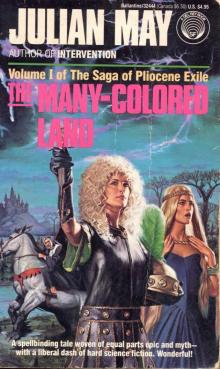 The Many-Coloured Land
The Many-Coloured Land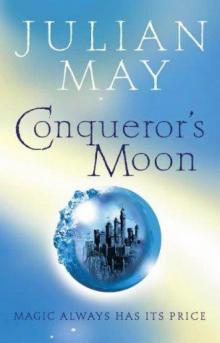 Conqueror's Moon
Conqueror's Moon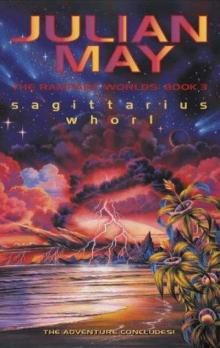 The Sagittarius Whorl
The Sagittarius Whorl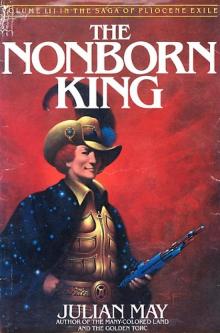 The Nonborn King
The Nonborn King Sky Trillium
Sky Trillium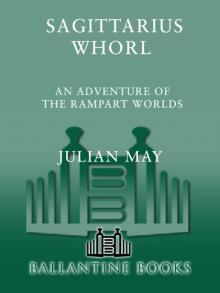 The Sagittarius Whorl: Book Three of the Rampart Worlds Trilogy
The Sagittarius Whorl: Book Three of the Rampart Worlds Trilogy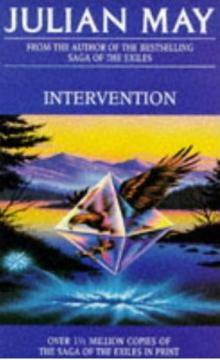 Intervention
Intervention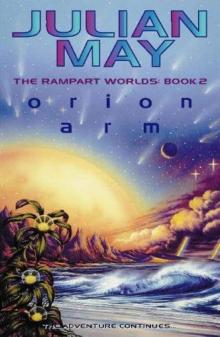 Orion Arm
Orion Arm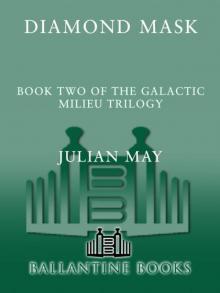 Diamond Mask
Diamond Mask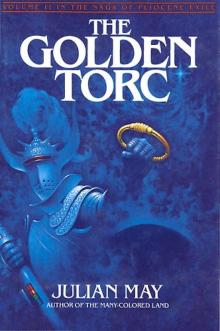 The Golden Torc
The Golden Torc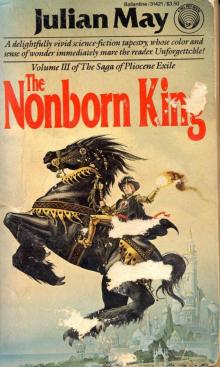 The Noborn King
The Noborn King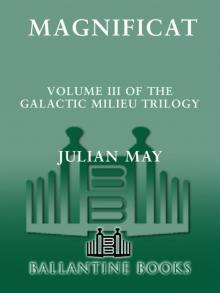 Magnificat
Magnificat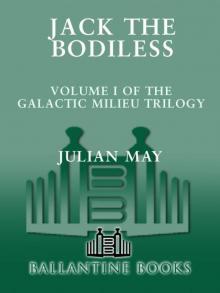 Jack the Bodiless
Jack the Bodiless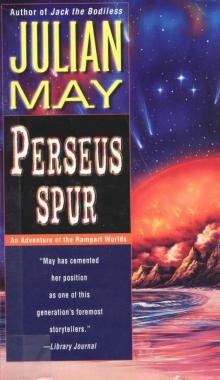 Perseus Spur
Perseus Spur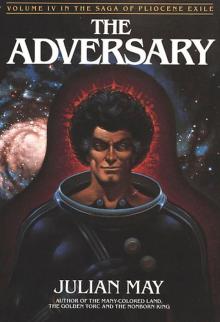 The Adversary
The Adversary Sorcerer's Moon
Sorcerer's Moon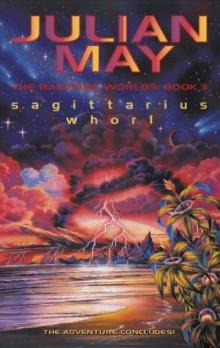 Sagittarius Whorl
Sagittarius Whorl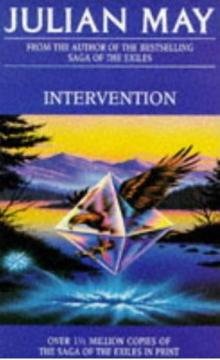 The Intervention (Omnibus)
The Intervention (Omnibus)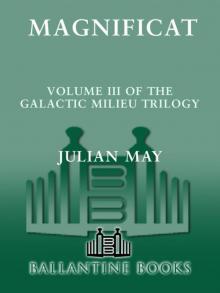 Magnificat (Galactic Milieu Trilogy)
Magnificat (Galactic Milieu Trilogy)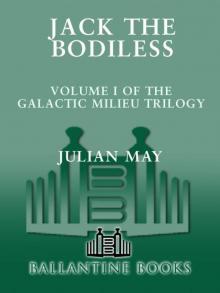 Jack the Bodiless (Galactic Milieu Trilogy)
Jack the Bodiless (Galactic Milieu Trilogy)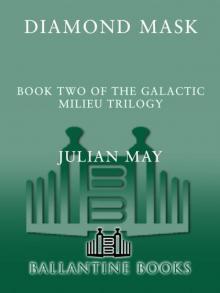 Diamond Mask (Galactic Milieu Trilogy)
Diamond Mask (Galactic Milieu Trilogy) The Many-Coloured Land sope-1
The Many-Coloured Land sope-1